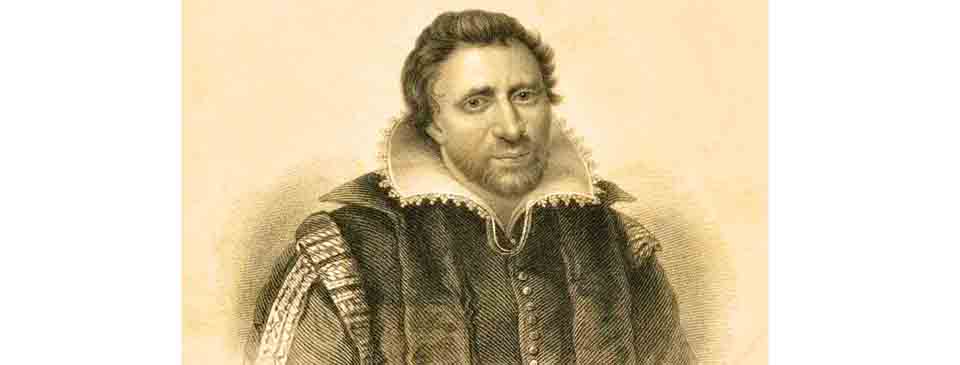Ben Jonson

This is one of numerous images of Ben Jonson, most of which are derived from the contemporary portrait by Abraham van Blyenberch that today hangs in the National Portrait Gallery. He was said to have one eye lower than the other.
Ben Jonson is primarily remembered as a London playwright who came to prominence during the latter years of the reign of Queen Elizabeth. Yet he also excelled in other forms of writing, including poetry, philosophy and history. His folio of work paved the way for that of his better-known fellow thespian, William Shakespeare, with whom he was very favourably compared by contemporaries. It was in his collaborations with Inigo Jones for the court of King James that Jonson reached the peak of his career. However, he was also to find himself in trouble with authorities on a number of occasions.
Born in London in 1572, one month after the death of his clergyman father, Jonson grew up in humble accommodation in an alleyway between the Strand and the Thames. He learnt to read and write at the St. Martin-in-the-Fields elementary school, followed by Westminster School. His teacher there was the noted classical scholar William Camden who, observing his literary gifts, was able to encourage him and provide a first-class education in Latin and Greek. It was during that time that Jonson gained his love of drama and verse.
Jonson took up a place at Cambridge University but had to return to London after only a few weeks to help his step-father with brick-laying during construction work at Lincoln’s Inn. A lasting practical benefit, however, was that he was able to claim citizenship of London thereafter as a member of the Tylers & Bricklayers’ Company, whereas most other actors of the time required the legal patronage of an aristocrat.
In the early 1590s Jonson left to join English forces fighting against the Spanish in the Low Countries. After returning to London he took up acting and writing, perhaps in a travelling company. In 1594 he married at St. Magnus the Martyr church at the north end of London Bridge but seems to have often lived apart from his wife during their lifetimes.
Jonson’s earliest surviving play, The Case is Altered, was first performed by the Pembroke Company in 1597. The co-authored The Isle of Dogs was premiered at the new Swan theatre at Bankside later that same year. For reasons unknown today it caused offence, being considered lewd, and, in response, the Privy Council ordered the closure of all London theatres. Jonson and two of the actors were arrested, charged and imprisoned in Marshalsea gaol. Following interrogation, Jonson was released but the Pembroke Company did not survive and some members joined Philip Henslowe’s Admiral’s Men company that performed at the Rose theatre. For several years Jonson worked as one of the regular writers for that company. Most of his works from that time are now either completely lost or known only by their title.
The first major success came with Every Man in His Humour, first performed by the Lord Chamberlain’s Men at the Curtain theatre at Shoreditch in 1598 with Richard Burbage and William Shakespeare in leading roles.
At that same time Jonson was involved in a duel at Hoxton Fields during which he killed his opponent, the actor Gabriel Spencer, one of those with whom he was imprisoned the previous year. He was tried at the Old Bailey but spared the death sentence because he was able to read the Bible (known as ‘benefit of clergy’) and was punished leniently by having his thumb branded and his possessions forfeited. While in prison he converted to Catholicism.
Between 1599 and 1601 various plays by Jonson were performed at the new Globe theatre and the Blackfriars theatre. Some were performed at the court of Queen Elizabeth but were generally not well received there.
Following the succession of King James to the English throne in 1603, however, Jonson composed a number of speeches and poetry for royal and civic occasions. In 1605 he and the designer Inigo Jones collaborated on The Mask of Blackness at Banqueting Hall, Whitehall Palace. Its success ensured that it was to be the first of a number of masques (musical fantasies performed by members of the royal court) that the pair were to work on together over many seasons.


